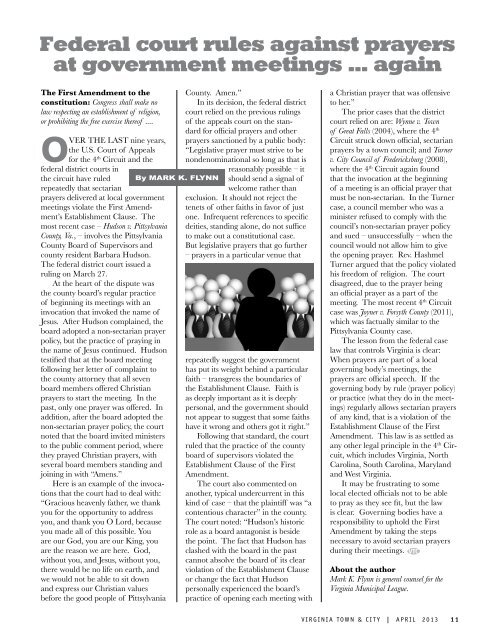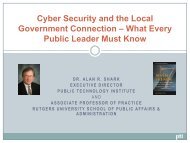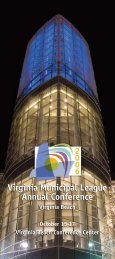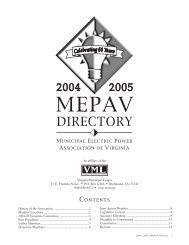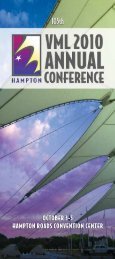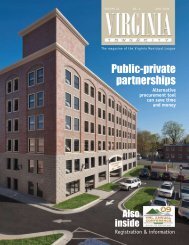Affordable Care Act - the Virginia Municipal League
Affordable Care Act - the Virginia Municipal League
Affordable Care Act - the Virginia Municipal League
You also want an ePaper? Increase the reach of your titles
YUMPU automatically turns print PDFs into web optimized ePapers that Google loves.
Federal court rules against prayersat government meetings ... againThe First Amendment to <strong>the</strong>constitution: Congress shall make nolaw respecting an establishment of religion,or prohibiting <strong>the</strong> free exercise <strong>the</strong>reof ....Over <strong>the</strong> last nine years,<strong>the</strong> U.S. Court of Appealsfor <strong>the</strong> 4 th Circuit and <strong>the</strong>federal district courts in<strong>the</strong> circuit have ruledrepeatedly that sectarianprayers delivered at local governmentmeetings violate <strong>the</strong> First Amendment’sEstablishment Clause. Themost recent case – Hudson v. PittsylvaniaCounty, Va., – involves <strong>the</strong> PittsylvaniaCounty Board of Supervisors andcounty resident Barbara Hudson.The federal district court issued aruling on March 27.At <strong>the</strong> heart of <strong>the</strong> dispute was<strong>the</strong> county board’s regular practiceof beginning its meetings with aninvocation that invoked <strong>the</strong> name ofJesus. After Hudson complained, <strong>the</strong>board adopted a non-sectarian prayerpolicy, but <strong>the</strong> practice of praying in<strong>the</strong> name of Jesus continued. Hudsontestified that at <strong>the</strong> board meetingfollowing her letter of complaint to<strong>the</strong> county attorney that all sevenboard members offered Christianprayers to start <strong>the</strong> meeting. In <strong>the</strong>past, only one prayer was offered. Inaddition, after <strong>the</strong> board adopted <strong>the</strong>non-sectarian prayer policy, <strong>the</strong> courtnoted that <strong>the</strong> board invited ministersto <strong>the</strong> public comment period, where<strong>the</strong>y prayed Christian prayers, withseveral board members standing andjoining in with “Amens.”Here is an example of <strong>the</strong> invocationsthat <strong>the</strong> court had to deal with:“Gracious heavenly fa<strong>the</strong>r, we thankyou for <strong>the</strong> opportunity to addressyou, and thank you O Lord, becauseyou made all of this possible. Youare our God, you are our King, youare <strong>the</strong> reason we are here. God,without you, and Jesus, without you,<strong>the</strong>re would be no life on earth, andwe would not be able to sit downand express our Christian valuesbefore <strong>the</strong> good people of PittsylvaniaBy Mark K. FlynnCounty. Amen.”In its decision, <strong>the</strong> federal districtcourt relied on <strong>the</strong> previous rulingsof <strong>the</strong> appeals court on <strong>the</strong> standardfor official prayers and o<strong>the</strong>rprayers sanctioned by a public body:“Legislative prayer must strive to benondenominational so long as that isreasonably possible – itshould send a signal ofwelcome ra<strong>the</strong>r thanexclusion. It should not reject <strong>the</strong>tenets of o<strong>the</strong>r faiths in favor of justone. Infrequent references to specificdeities, standing alone, do not sufficeto make out a constitutional case.But legislative prayers that go fur<strong>the</strong>r– prayers in a particular venue thatrepeatedly suggest <strong>the</strong> governmenthas put its weight behind a particularfaith – transgress <strong>the</strong> boundaries of<strong>the</strong> Establishment Clause. Faith isas deeply important as it is deeplypersonal, and <strong>the</strong> government shouldnot appear to suggest that some faithshave it wrong and o<strong>the</strong>rs got it right.”Following that standard, <strong>the</strong> courtruled that <strong>the</strong> practice of <strong>the</strong> countyboard of supervisors violated <strong>the</strong>Establishment Clause of <strong>the</strong> FirstAmendment.The court also commented onano<strong>the</strong>r, typical undercurrent in thiskind of case – that <strong>the</strong> plaintiff was “acontentious character” in <strong>the</strong> county.The court noted: “Hudson’s historicrole as a board antagonist is beside<strong>the</strong> point. The fact that Hudson hasclashed with <strong>the</strong> board in <strong>the</strong> pastcannot absolve <strong>the</strong> board of its clearviolation of <strong>the</strong> Establishment Clauseor change <strong>the</strong> fact that Hudsonpersonally experienced <strong>the</strong> board’spractice of opening each meeting witha Christian prayer that was offensiveto her.”The prior cases that <strong>the</strong> districtcourt relied on are: Wynne v. Townof Great Falls (2004), where <strong>the</strong> 4 thCircuit struck down official, sectarianprayers by a town council; and Turnerv. City Council of Fredericksburg (2008),where <strong>the</strong> 4 th Circuit again foundthat <strong>the</strong> invocation at <strong>the</strong> beginningof a meeting is an official prayer thatmust be non-sectarian. In <strong>the</strong> Turnercase, a council member who was aminister refused to comply with <strong>the</strong>council’s non-sectarian prayer policyand sued – unsuccessfully – when <strong>the</strong>council would not allow him to give<strong>the</strong> opening prayer. Rev. HashmelTurner argued that <strong>the</strong> policy violatedhis freedom of religion. The courtdisagreed, due to <strong>the</strong> prayer beingan official prayer as a part of <strong>the</strong>meeting. The most recent 4 th Circuitcase was Joyner v. Forsyth County (2011),which was factually similar to <strong>the</strong>Pittsylvania County case.The lesson from <strong>the</strong> federal caselaw that controls <strong>Virginia</strong> is clear:When prayers are part of a localgoverning body’s meetings, <strong>the</strong>prayers are official speech. If <strong>the</strong>governing body by rule (prayer policy)or practice (what <strong>the</strong>y do in <strong>the</strong> meetings)regularly allows sectarian prayersof any kind, that is a violation of <strong>the</strong>Establishment Clause of <strong>the</strong> FirstAmendment. This law is as settled asany o<strong>the</strong>r legal principle in <strong>the</strong> 4 th Circuit,which includes <strong>Virginia</strong>, NorthCarolina, South Carolina, Marylandand West <strong>Virginia</strong>.It may be frustrating to somelocal elected officials not to be ableto pray as <strong>the</strong>y see fit, but <strong>the</strong> lawis clear. Governing bodies have aresponsibility to uphold <strong>the</strong> FirstAmendment by taking <strong>the</strong> stepsnecessary to avoid sectarian prayersduring <strong>the</strong>ir meetings.About <strong>the</strong> authorMark K. Flynn is general counsel for <strong>the</strong><strong>Virginia</strong> <strong>Municipal</strong> <strong>League</strong>.VIRGINIA TOWN & CITY | april 2013 11


